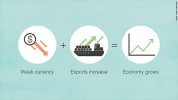Interesting and timely article. I don't think everything applies as the "export" of hunting is rather an "import" of client, but still relevant I think.
http://money.cnn.com/2015/09/02/news/economy/global-currency-down-china/index.html
Investing Guide
Who wins when global currencies tumble?
By
Patrick Gillespie @CNNMoney
Three ways China's currency plunge affects your money
Currencies are crashing across the globe.
The Brazilian real has lost 28% against the dollar just this year. The Turkish lira 20%, Colombian peso 23% and the Indonesian rupiah is down 11% versus the dollar in 2015.
On the face of it, these are alarming moves. Yet, a lower currency value is something that some countries actually want.
China, for instance,
devalued the yuan by 2% last month, its largest move in two decades. Experts believe the prime motivation was to make the country's exports more attractive to international buyers.
Certainly, a weak currency helps boost exports, which can ultimately lift the economy.
"I wouldn't be surprised if we're saying in two years that this currency weakening paved with the way for better economic performance," says Neil Shearing, chief emerging markets economist at Capital Economics.
However, in the short term a falling currency is also a reflection of weakness in underlying countries.
In fact, the dramatic global currency declines are raising the specter of the
Asian financial crisis of 1997, which was triggered by the devaluation of the Thai baht, that fell 20% in one day. That crisis reverberated worldwide sending international stock markets to record lows and shook investors' confidence in the region for over a decade.
Related: What's behind China devaluation
What's behind latest currency declines?
The latest bout of currency declines is directly linked to the dramatic drops in commodity prices, unlike the Thai baht crisis, which was spawned by a huge debt-fueled real estate bubble.
Many countries like Brazil are excessively reliant on exporting commodities like iron, copper, soy and oil. And almost all of these commodities have tumbled to six-year lows this year, stemming from
falling demand globally, particularly from China.
China's slowdown has put the brakes on its previously-insatiable demand for natural resources.
The currencies fell in value along with the drop in commodities prices.
Add to that the potential
Fed rate hike, and global investors are reluctant to move out of dollars into riskier currencies, which is exacerbating their decline.
Related: Brazil falls deep into recession
Weak currency = more exports
If managed carefully, these weak-currency countries might have the last laugh -- and profit.
A weak currency can eventually spark more economic growth in these two ways:
1. A weak currency makes exports cheaper -- and more attractive -- to foreign buyers.
2. It makes imports more expensive and less attractive to citizens, who are then more inclined to buy local.
Those two actions boost trade, fuel local demand and help economic growth.
"They should see the benefits in their global trade," says Andrew Karolyi, a Cornell professor and emerging market expert.
Brazil, for instance, recently fell into recession. It's currency, the real, has tanked 27% this year. But in the second quarter, Brazil's exports went up 7%, according to Capital Economics.
That's not going to offset all the negative factors, but it's a "glimmer of hope," for Brazil's economic future, says Shearing.
Related: Investors pull $1 trillion out of emerging markets
But beware of a trade war
One Wall Street expert Mohamed A. El-Erian, the chief economic adviser at Allianz,
described China's recent
currency devaluation as an attempt to "steal" economic growth from other countries.
It certainly is worrisome for countries that China competes with for exports.
Vietnam has already devalued its currency, the dong, for the third time this year after China's move.
The two decisions to devalue currencies raise the potential for a
"currency war" where governments across the globe repetitively devalue their currencies in an effort to gain a competitive trade advantage and lead to a dangerous spiral.
Related: The dollar is on its fastest rise in 40 years
Can't afford global goods
What we need to watch out for is if these currencies fall a lot lower.
That's when it starts affecting ordinary citizens, especially in countries that rely on imports for everyday goods. Prices for everything priced in dollars goes up.
Venezuela is a prime example of how bad it can get.
One U.S. dollar equaled 82 bolivars a year ago and now it's worth 698 bolivars, according to
dolartoday.com, a website that tracks the unofficial rate.
Related: The U.S. dollar's breathtaking rally in images
Venezuela's economy
is in shambles and basic goods like napkins are hard to come by. Earlier this year, officials from Trinidad and Tobago
allegedly offered to send tissue paper to Venezuela in exchange for oil.
Sugar, milk and flour are not easy to buy either. That's a problem when 70% of consumer goods are imported, according to the Brookings Institution.
Related: Venezuela's currency is worth less than a napkin
Plunging currencies also make it very hard for countries and companies to pay back debt that is denominated in U.S. dollars. As the currency loses in value, the dollar-denominated debt becomes more expensive and difficult to pay back.
Expensive debt eats away at profits and economic growth.
In the past, emerging economies like Brazil and Thailand suffered from a similar situation when much of their government or corporate debt was in dollars. That's much less of a problem now because they don't have that much debt.
With plenty of headwinds, it could take many of these countries years to
turn the corner. But when they move in the right direction, experts say weak currency-related exports could be at the root of that turnaround.
Related: China devalues currency in shocking move.
Related: The strong dollar punishes these companies
CNNMoney (New York) September 2, 2015: 12:22 PM ET
)


 ..
.. .
.









